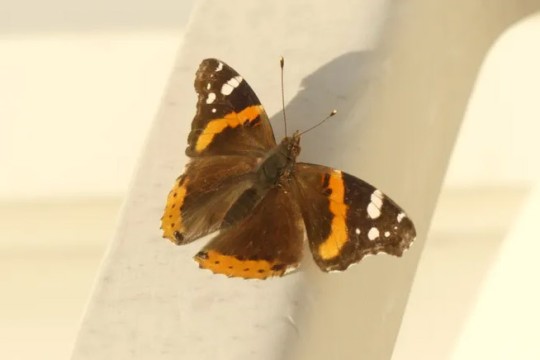News
Kaitlin Stack Whitney
-
April 2, 2025

Warm temperatures mean ticks are active in upstate NY: What to know
Democrat and Chronicle speaks to Kaitlin Stack Whitney, assistant professor in the Department of Science, Technology, and Society, about being watchful for ticks this spring.
-
May 8, 2024

More than monarchs: Red admirals appear in Rochester with spring
The Democrat and Chronicle talks to Kaitlin Stack Whitney, assistant professor in the Department of Science, Technology, and Society, about the early arrival and habits of the red admiral butterfly in Monroe County, highlighting its migration patterns, habitat range, and behavior.
-
March 18, 2024

Does the warm winter mean we will see mosquitoes earlier in NY?
The Democrat and Chronicle talks to Kaitlin Stack Whitney, assistant professor in the Department of Science, Technology, and Society.
-
June 12, 2023

Exploring the complexities of using ladybugs as pest control
In an attempt to limit the use of chemical pesticides and promote native species on their land, some gardeners have begun purchasing ladybugs as a form of “natural” pest control. However, Assistant Professor Kaitlin Stack Whitney says that buying ladybugs online, as opposed to attracting them naturally, can cause more harm than good.
-
March 21, 2022

Environmental evolution: RIT part of the largest-ever study
WROC-TV talks to Kaitlin Stack Whitney, assistant professor in the Department of Science, Technology, and Society, about her team's research on white clover.
-
March 17, 2022

RIT scientists part of massive study on clover showing urbanization drives adaptive evolution
RIT contributed to a massive study on a tiny roadside weed that shows urbanization is leading to adaptive evolution at a global scale. As part of the Global Urban Evolution Project (GLUE) project, scientists from 160 cities across six continents collected more than 110,000 samples of white clover plants in urban, suburban, and rural areas to study urbanization’s effects on the plants.
-
October 4, 2021

RIT researchers part of $15 million NSF grant aimed at reducing food waste
A $15 million grant from the National Science Foundation will be used to establish the first national academic research network on wasted food in the United States. Under the grant, researchers from American University will lead 13 other institutions, including RIT, in a five-year project.
-
October 29, 2019

Bee-Friendly Companies Are Getting the Science of the Crisis Completely Wrong
OneZero talks to Kaitlin Stack Whitney, assistant professor in the science, technology and society department and the environmental sciences program, about the effect of corporations' efforts to protect honeybee populations.
-
August 26, 2019

RIT researches the status of pollinators
Research being conducted by RIT students and faculty will help determine if additional flowers, grasses and plants will benefit insects that help in pollination. The research is being done across the state, particularly next to roadways, and could help determine if later or fewer cuts to the vegetation next to the roads would help pollinators by allowing more time for plants to flower.
-
June 25, 2019

An unstoppable partnership: Seneca Park Zoo and RIT
ZooNooz, a publication by the Seneca Park Zoo, highlights projects with RIT.
-
June 20, 2019

Artificial intelligence and Google Street View could hold the key to stopping invasive plants
The New York State Department of Environmental Conservation will award two RIT faculty members a grant to map roadside infestations of five key invasive plant species in the Finger Lakes and Adirondack Park over the next two years.
-
May 6, 2019

Many see white clover as a weed, but it’s important to bees
WXXI reports on RIT’s work on the Global Urban Evolution Project.








